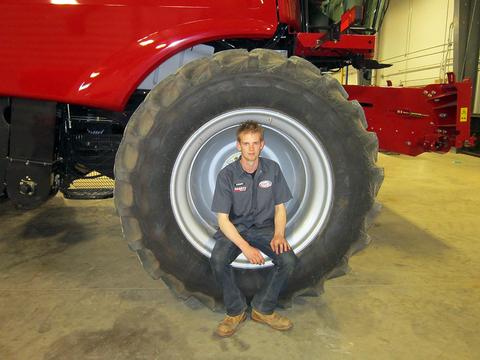Joseph McSparran

I am an... agricultural technician
You could be an agricultural technician if you would enjoy:
- Finding out how things work
- Fixing and maintaining machinery
- Operating machinery
- Working with agricultural equipment
- Analysing and solving problems
Many of our graduates enjoy working overseas where there are a vast range of opportunities for high calibre engineers. Joseph McSparran, from Northern Ireland, works in Canada for Young’s Equipment. He graduated in 2012 with a BEng (Hons) Agricultural Engineering.
The role of agricultural technician gives the 25-year-old the opportunity to develop his three great interests of agricultural engineering, operating machinery, and fixing/maintaining that machinery.
“Having experience in all three fields will help me to become a knowledgeable all-round agricultural engineer. This is my ultimate aim, as I will understand everything from the concept of designing a machine right through to operating the machinery
“I really enjoy the challenging aspects of the job. The satisfaction of pleasing the farmer by fixing something that was broken, for instance. I also enjoy learning how everything functions.”
It is certainly a varied role that keeps him on his toes: “It involves repairing and maintaining machinery, making maintenance checks on mechanical, electrical, electronic, hydraulic and pneumatic systems. Also inspecting, removing and replacing, and testing equipment. It is important to maintain effective communication with the customer throughout the repair, so they are aware of the progress being made and the cost of parts that are necessary and recommended by the mechanic. So far I have worked on combines, swathers, headers, tractors, sprayers, skidsteers, seed/fert drills and tanks. Two projects which I am currently working on are converting a manual metering unit into a hydraulic metering unit on a seed hawk tank. The other project is on a 8120 Case combine were I carried out an inspection highlighting troubled areas, then wrote up a service quote informing the customer of the cost and then carried out the necessary repair on the items he wanted done.
Joseph has been profiled by Bright Crop, an initiative to encourage new young talent to consider a career in food and farming: www.brightcrop.org.uk
More from Joseph on Harper Adams, placement and his career
Why did you choose to study at Harper Adams?
It has an excellent reputation in the agricultural engineering industry and is renowned for having good contacts in this industry. Also, it was recommended to me by previous graduates.
What were the best things about your course?
It was very varied, with a good mixture of hands-on projects and theory-based exercises. However, the placement year was the best thing about my course, as it gave me an insight in what a career in agricultural engineering involves. Also, during the course, there were several projects that wereinteresting; these increased my understanding of various principles and theories in agricultural engineering. Some examples included designing a hydraulic circuit for a skid-steer loader and designing and building a human-powered off-road buggy.
Did the course make you more employable?
Yes, mainly because of the placement year. Employers look kindly on a solid block of experience when considering applicants for positions. It helped me to improve my interpersonal, IT, and technical skills. There were various group projects integrated into the course, which increased my confidence and public-speaking skills, as well as helping me to understand how to work well in a team for a joint aim.
Tell us a little about any projects you worked on.
My dissertation was titled ‘The effect of a fully-mounted implement on the torque and power flow in a four-wheel drive tractor’. I aimed to determine the effects that tractor speed, implement depth, and soil conditions had on torque and power flow. My supervisor was Ianto Guy, who also gave me the idea, which was a follow-on from his own PhD. Glynn Hughes assisted me with the instrumentation area of the project, and Sarah Parsons helped me with the analysis. I found that speed, depth, and soil conditions significantly (p<0.01) affected the torque and power-flow of the fully-mounted implemented. The front axle transmitted an almost constant supply of power under all test combinations. Drawbar pull increased linearly with weight transfer. Under sudden loading, weight addition negatively affected drawbar pull, causing wheel slip to increase. The instrumentation system functioned correctly, and was able to detect small changes in operating parameters; therefore this would be useful in the real world. It was evident from this study that further research is required to control dynamic weight transfer in the tractor, to improve traction losses subsequently, therefore reducing power losses and increasing profits for the farmer. I am keen to pursue this topic further in the future, if the opportunity arises. This test set-up could be used in field test vehicles, to allow for better monitoring of the tractor’s performance, as the current diagnostic systems mostly record electrical faults as opposed to mechanical faults. Mechanical parts still rely on human judgement. This system could assist designers in developing new and more efficient systems of transmitting engine power to the ground. As this research demonstrated, a lot of power is consumed by the hydraulic pump and drive-line. This system could also benefit farmers by providing better information to correctly adjust the tractor’s set-up, increasing the tractor’s fuel economy.
How did your qualification/ experiences at Harper Adams aid your career?
My qualification has had a big impact because it helped me attain the required points for my Visa to enable me to work in Canada after accepting the job with Young’s Equipment. The life skills I have learned at university will put me in good stead for such a big move.
Do you think being a graduate made a difference to your position and salary?
My employer showed some interest in the level of my qualification as I sent him the grades I had attained at the point of application (which was prior to graduation) so he could determine my strengths and weaknesses. However, he was more interested in my experience due to the practical nature of the job. The sandwich year was therefore the most valuable part of my degree for this reason. However, without the qualification itself I probably would have been offered a lower salary as possessing a degree demonstrates that you have a certain set of skills, such as research and development. Furthermore, without my degree I would not have been eligible for the particular visa I applied for to enable me to live and work in Canada.
What did you do on placement?
I worked for Case New Holland, as a Field Test and Development Engineer.
My role involved:
- Procurement and shipping of parts and equipment to support tractors at global test locations.
- Tracking of tractor hours, usage of failures and failed parts
- Data input to computer databases
- Workshop and field activity to prepare tractors for testing
- Investigating failures and making repairs
- Use of electronic diagnostic tools (EST, Samtec and CANalyser) and completion of tests in workshop, track, and field
What was the best thing about the year?
It provided me with invaluable experience and a solid foundation on which to build my developing career. The company itself was friendly and supported me in all my endeavours. I really enjoyed the job, as it was interesting and challenging, and I always took great satisfaction and pride in my work. Fellow employees took my opinion seriously, which made me become more confident in my abilities and were always there if I needed their help. I was also involved in some online conferences, which further improved my interpersonal skills and heightened my confidence, and made me feel that I had a valuable role in the company.
Do you think placement enhanced your career prospects?
Yes. As I worked for a well-respected and credible company, this gave me a valuable work-reference for my CV. I also made many contacts during the year which I have found useful when applying for jobs.
What advice do you have for a student interested in doing a similar job?
Aim to leave Harper Adams with at least a 2:1 and ensure that you use all available time in the vacations to gain experience which will put you ahead of other people, as generally agricultural engineering jobs are very practical. This will make life easier when you come to look for a fulltime job. Also make a good impression wherever you go to ensure you obtain a good reference as from my own experiences, a CV only assists in aiding in securing you an interview; a good reference can help to distinguish you from other applicants.
Finally, why would you recommend Harper Adams to other students?
It is a good place to meet lifelong friends with similar interests. Harper Adams also has excellent contacts within the agricultural machinery industry and there is a useful career service which helps with interview techniques and CV writing. There are excellent teaching facilities with some useful learning assessments. I found the Placement and careers fair especially beneficial, when lots of well-known employers come to the university, allowing students to talk to different employers about what their company has to offer.





